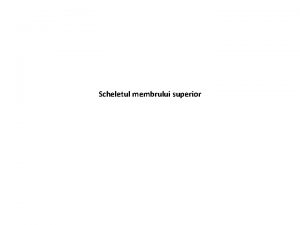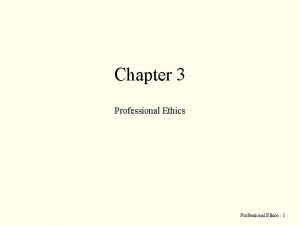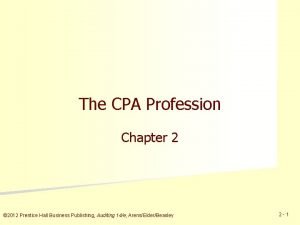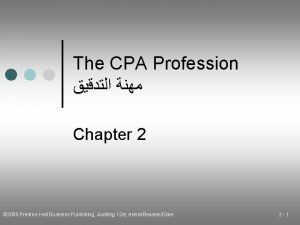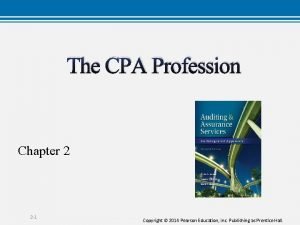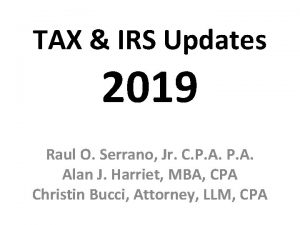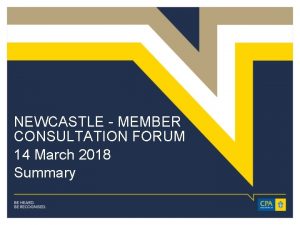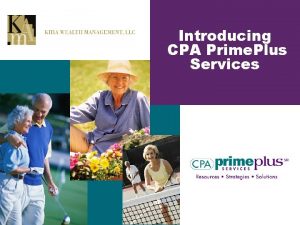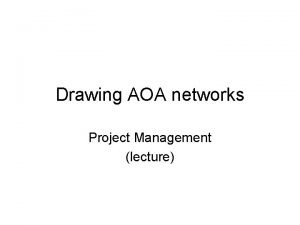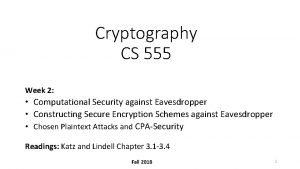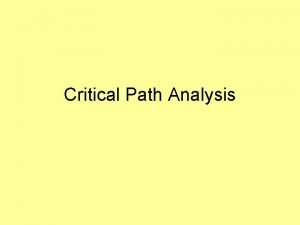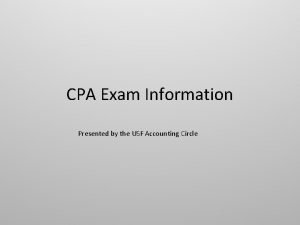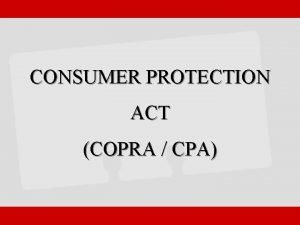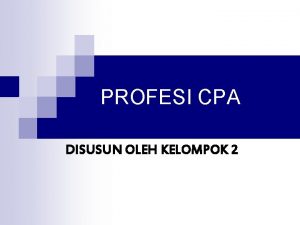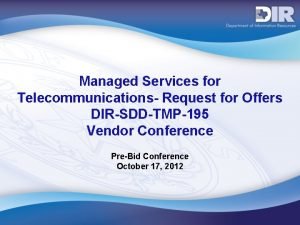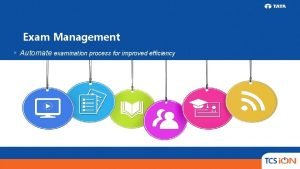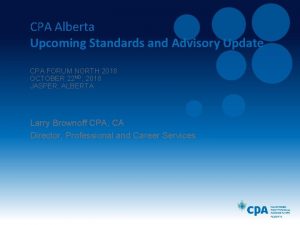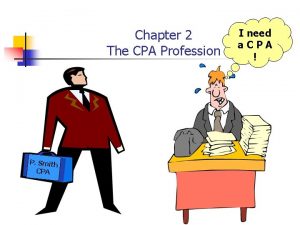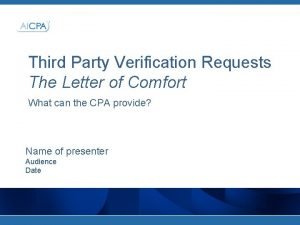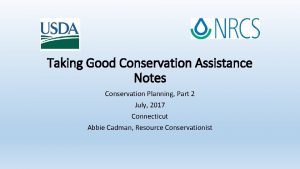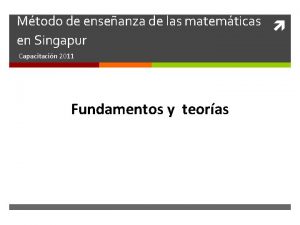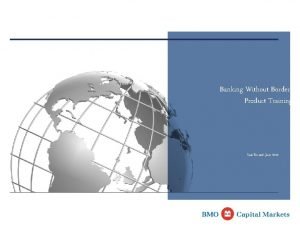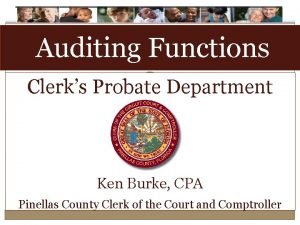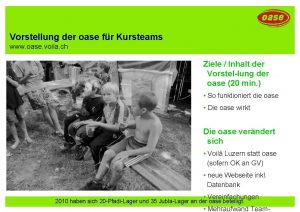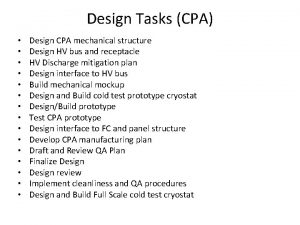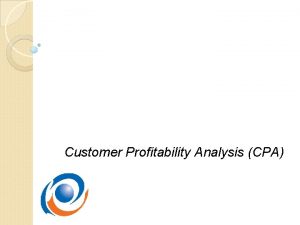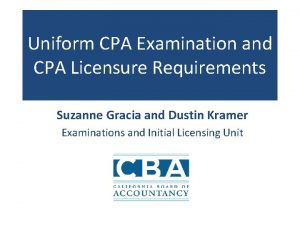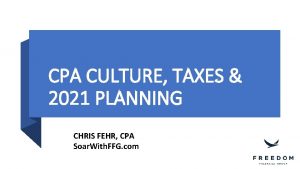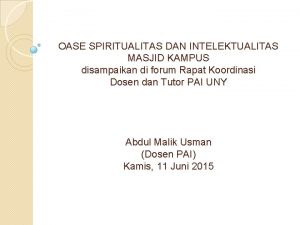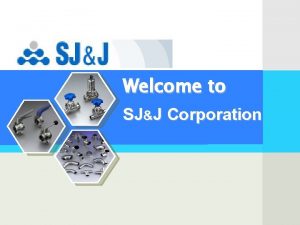WELCOME TO David Oase CPA A Professional Corporation



































- Slides: 35

WELCOME TO David Oase CPA A Professional Corporation BEST PRACTICES SERIES 1

Legal Disclaimer All information presented here is intended for the addressees only • Any use of this information for anyone other than the addressee is strictly prohibited unless approved by David Oase CPA PC All information provided here is for discussion purposes only; actual situations may vary • • • David Oase CPA PC makes every attempt to provide accurate and concise information in this presentation Some information may change over time, depending on each client’s situation David Oase CPA PC does not provide any legal services or legal advice to clients All information and processes presented here are copyrighted by David Oase CPA PC 2

Best Practices. . . Non-Profit Organizations Types, Forms, & Filing Requirement's 3

Only 501(c)3 right? Type Description Deductible 501(c)1 Credit Unions Yes 501(c)3 Charitable Orgs Yes 501(c)4 Social Welfare Orgs No 501(c)6 RE Boards, Chamber No 501(c)7 Social Clubs No 501(c)10 Fraternal Societies Yes 501(c)12 Water/ISP Co-op No 501(c)19 VFW/Legion’s Club No 501(c)29 Co-op Health Insurance No 4

Arizona Corporation Commission 1. Only IRS Grants Non-profit Status 1. LLC, S-Corp, Corporation, Sole Proprietor, Non-Profit 2. Still have to publish 2. Annual Report – EVERY SINGLE YEAR 1. $10 2. Update officers, directors, addresses 3. Sign up for email updates 5

Application for EIN • IRS form SS-4 – Takes about a week, snail mailed to you OR • Online at IRS. gov – Instantaneous 6

Applications for Exemption • Form 1023 -EZ – IRS prefers you file online, some filers might not be eligible for efile – Foreign Origins – Most used application, is for 501(c)3 status • Form 1024 – Can not be electronically filed. – Used for other 501(C) types like Rotary Clubs 7

Income Tax Returns Exempt organizations (except religious organizations) have to file form 990 1. 990 -PF is filed electronically for all private foundations and 4947(a)(1) non-exempt charitable trusts. 2. 990 -N (e-postcard) has 8 questions, is filed electronically if receipts are < $50 k 3. 990 -EZ two page return IF gross receipts < $200 k AND assets were < $500 k 4. 990 is the long form. Gross receipts are > $200 k OR assets were > $500 k 5. 990 -T is an additional filing requirement mostly for reporting Unrelated Business Income Tax also known as UBIT. ü 990 forms are due on the 15 th day of the 5 th month following the end of the organization’s taxable year. 8

UBIT • • • Even though an organization is recognized as tax exempt, it still may be liable for tax on it’s unrelated business income. For most organizations, unrelated business income is income from a trade of business, regularly carried on, that is not substantially related to the charitable, educational, or other purpose that is the basis of the organization’s exemption. An exempt organization that has $1, 000 or more of gross income from an unrelated business must file form 990 -T. An organization must pay estimated tax if it expects it’s tax liability to be $500 or greater for the year. The obligation to file Form 990 -T is IN ADDITION to the obligation to file the annual information return, Form 990, 990 -EZ, 990 -N, or 990 -PF. 9

UBIT Examples • Your exempt organization is close to the Uof. A and during games you rent out your parking lot. • You have physical location your exempt organization has purchased and you’re mortgaging. You rent out space to an unrelated tenant. • You’re operating a soup kitchen for the homeless but there is interest in the community for you to sell your food. 10

Due Dates All Forms 990 • Due on the 15 th day of the 5 th month following the close of the organization’s business year. – Organization uses a calendar year, forms 990 are due on May 15 th – Organization uses a fiscal year ending June 30 th, forms 990 are due December 15 th – In any calendar case, exempt organization may file form 8868, application for extension which will extend the due date of the return 6 months. » If the exempt organization owes tax, the tax is due on the 15 th day of the 5 th month following the close of the organization’s business year. The extension extend the tax return but does NOT extend the date of the tax due. 11

Penalties and Exempt Status Revocation • If an organization whose gross receipts are less than $1 M for its tax year files its Form 990 after the due date (including extensions), and the organization doesn’t provide “reasonable cause” for filing late, the IRS will impose a penalty of $20 per day for each day the return is late. The maximum penalty is $10, 000, or 5% of the organization’s gross receipts, whichever is less. The penalty increases to $100 per day for organizations with gross receipts over $1 M. • An organization that fails to file the required form 990 for three consecutive tax years will automatically lose its tax-exempt status. 12

Reasonable Cause and Penalty Abatement Typical Situations The IRS will consider any sound reason for failing to file a tax return, make a deposit, or pay tax when due. Sound reasons, if established, include: • Fire, casualty, natural disaster or other disturbances • Inability to obtain records • Death, serious illness, incapacitation or unavoidable absence of the taxpayer or a member of the taxpayer’s immediate family • Other reason which establishes that you used all ordinary business care and prudence to meet your Federal tax obligations but were nevertheless unable to do so Documents You May Need Most reasonable cause explanations require that you provide documentation to support your claim, such as: • Hospital or court records or a letter from a physician to establish illness or incapacitation, with specific start and end dates • Documentation of natural disasters or other events that prevented compliance 13

Best Practices. . . Non-Profit Organizations Operations & Documentation 14

Non-Profits and Payroll Officer, Director, Trustee Payroll • 990 long, Page 7 • 990 -EZ, Page 2 • 990 -N, No reporting requirement Differences in Payroll Taxes • Payments for services performed by an employee of a religious, charitable, educational or other organization described in section 501(c)(3) that are generally subject to FICA (Social Security and Medicare) taxes if the payments are $100 or more for the year, are not subject to FUTA (unemployment) taxes. 15

Using Cash – Income / Expenses Generally - Corporation/LLC/Exempt Organizations have no cash – Deposits • All deposits must hit the business bank account. No cash back – Spending cash: If you have CASH it would have to come from • • • A debit card or ATM withdrawal A check written to yourself – Distribution Personal funds • Best Practices: Using cash for business expenses – – It is usually easier to have all cash purchase treated as if you are spending personal cash for the business The business would need to reimburse you for that expense. The reimbursement can happen periodically 16

Using Cash – Income / Expenses Exempt Organization has a “Petty Cash” account – This would not be your money, but the exempt organization’s money – All cash and/or receipts should add up to the beginning balance amount 17

If you spend PERSONAL Money on a Organization expense The Organization will need to reimburse you PERSONALLY for the expense Exempt Org Personal Organization checking account Personal checking account Organization credit card Personal credit cards If you spend Exempt Org money on a PERSONAL expense You will need to reimburse the Organization 18

A Note about Reimbursements If you use PERSONAL FUNDS for a BUSINESS EXPENSE – The Corporation/LLC owes you money – You should turn the expenses into the corporation and have the corporation/LLC write you a check for that amount – Reimbursements can be grouped as one for the entire year or other time period. • They do not need to be paid individually If you use BUSINESS FUNDS for a PERSONAL EXPENSE – You will owe the Corporation/LLC money – This can be taken as a distribution from the Corporation/LLC – This would be treated as a non-deductible expense from the Corporation/LLC, which would increase the profit of the Corporation/LLC – You should try to avoid this if possible. DO NOT USE THE BUSINESS ACCOUNT AS YOUR PERSONAL CHECKBOOK 19

A Note about Reimbursements Exempt Organization Reimbursements – All reimbursements need to be booked by 12/31 – Unreimbursed expenses may be straight deduction on your personal return – There should be an expense reimbursement policy in your bylaws • Types of expenses • Dollar limit • Who is authorized to be reimbursed – HINT: Try to avoid reimbursements, it will save you time with your paperwork 20

Bank Account Documentation Business checking account - Documentation needed – Bank statement and canceled check • Note: Be certain you have a copy of your cancelled check with your bank statements • Do you get your statements online only? How long are they available? – Keep receipts! • You may need receipts to prove to the IRS what was purchased • Do not typically need receipt for tax purposes – Debit cards transactions • Charge will appear on bank statement • Still need receipt for audit purposes 2 1

Credit Card Documentation Business credit card - Documentation needed – Credit card statement and receipts • The credit card statement is not evidence enough for IRS documentation purposes – Keep receipts! • You may need receipt to prove to the IRS what was purchased • Do not typically need receipt for tax purposes 2 2

Cash Documentation Cash - Documentation needed – Receipts - This is your only proof of expense – No receipt? What if you do not have a receipt? • A written/typed note? • Contemporaneous - Taken at the time the event or transaction happened • Use daily calendar – See later in notes 2 3

A Note About Your Books Profit & Loss Statement Balance Sheet Shows income and expense items only All Corporations are required to have a balance sheet • Income • Assets = Liabilities + Equity • • Only income should be shown here Loans to the business are not income • Expenses • • All items listed should be expenses Not all money spent from business is a business expense • • Many clients do not have an accurate balance sheet without help Difficult to be accurate if you do not have some type of accounting training • Annually • • All Corporations/LLC’s should have a year end balance sheet Manually calculate if you do not have a reconciled set of books 24

IRS Definition – Business Expense A “Business Expense” is an expense that is Ordinary and Necessary for carrying on a trade or business Ordinary and necessary defined • Ordinary – Common and accepted in your industry • Necessary – Helpful and appropriate for your trade or business • An expense does not need to be indispensable to be considered necessary 25

Definition – Business Expense In other words… • If the business spends money on something, will it add to CURRENT or FUTURE PROFITABILITY of the business • If the answer is “YES”, you could be on your way to a deductible expense 26

Expense Accounts Example 1. Advertising & Promotion 2. Auto Expense 3. Bank Fees 4. Customer Costs 5. Customer Gifts 6. Commissions & Fees 7. Dues & Publications 8. Education & Development 9. Equipment Purchases 10. Insurance 11. Meals – No Entertainment 12. Office Supplies/Expenses 13. Professional Fees 14. Postage & Delivery 15. Rent/Lease Payments 16. Telecommunications 17. Travel Expenses 18. Utilities Expense 19. Wages/Salaries 20. Ask My Accountant (AMA) 27

Classes/Classification • “How efficient is your exempt organization? ” – Utilize classes or account classifications • Programs • Management / General Expenses • Fundraising Expenses 28

Best Practices. . . Non-Profit Organizations Record Retention 29

What Do I Need to Keep? ALL transactions on ALL business accounts should be recorded in your books Bank Statements Record all checks, debit card charges, bank fees Credit Card Statements Cash Expenses Record all cash separately in the company books Purchase is an expense from the date of purchase. Must take possession of item 30

What Do I Need to Keep? Here is what you will need to keep • Banks and institutions • Bank statements and copies of cancelled checks • Credit card statements • Retirement account statements • Invoices and bills Don ’ your t rely on your reco r at le dkeepe bank to r. D ast o be o nce per y wnload ear • Accounts payable – bills you pay • Sales invoices for customers or income • Receipts • All receipts for business purchases • Debit/credit card statements are not evidence enough • Cash receipts • A receipt for a cash purchase is your only proof • A contemporaneous record - A note a time an event happens is better than nothing else at all 31

Mileage Logs Auto Mileage Logs • Typically one of the largest deductions on a tax return Smartphone APP • Mile IQ App – Best Practice Traditional Method • Individual data entry in log book • Or use hand written log book • Old school paper and pencil with same information as above 32

FAQs: Recordkeeping Can I keep only electronic statements instead of paper? • Yes - Paper or electronic is fine • Best Practice is that you download all statement to your possession at lease once per year. Best to do this when preparing for your taxes • Do not let the bank/institution be your recordkeeper Do I still need to keep receipts if I have everything listed on one credit card statement? • Yes – a bank/credit card statement is not evidence enough. You may need to provide the receipt Does my CPA need to see all my receipts and records when preparing my tax return? • NO – for tax preparation purposes, we would use your P&L statement or summary total. It is assumed you always have the substantiation for any expense item you provide us for your taxes In an AUDIT, will the IRS or State want to see all my receipts and records? • More than likely – YES. In a Federal or State audit, they can request to see your statements and receipts When is a purchase a deduction? • A purchase is a deduction at the time you take possession of the item. Not when you pay for it • Record all transactions with the proper date 33

How Long to Keep? How long do I need to keep my records? • Best Practice – Keep about 7 years of documents • Receipts and invoice statements • Bank statements – download them • Credit card statements – download them • Why? • The IRS can go back 3 years from the date a return is filed • 25% understatement of income can be 6 years back • NOL origination can go back 20 years What about tax returns? tice! Prac Best • Best Practice – Keep indefinitely 34

Questions and Answers 35
 Oase mit artesischem brunnen
Oase mit artesischem brunnen Oasele maini
Oasele maini Zegenlied opwekking
Zegenlied opwekking Oase carpiene
Oase carpiene Rules of professional conduct cpa ontario
Rules of professional conduct cpa ontario Welcome welcome this is our christmas story
Welcome welcome this is our christmas story The cpa profession chapter 2
The cpa profession chapter 2 Cpa firm hierarchy
Cpa firm hierarchy The cpa profession chapter 2
The cpa profession chapter 2 The cpa profession chapter 2
The cpa profession chapter 2 Raul serrano cpa
Raul serrano cpa Golden goose cpa
Golden goose cpa Robyn erskine cpa
Robyn erskine cpa What is the meaning of “drm” in manuevering board?
What is the meaning of “drm” in manuevering board? Cpaprime
Cpaprime Cpa pert
Cpa pert Cpa security
Cpa security Cpa critical path analysis
Cpa critical path analysis Usf accounting major
Usf accounting major Cpa building detroit
Cpa building detroit Cpa lesson plan
Cpa lesson plan Vincent 1982
Vincent 1982 Materi profesi cpa
Materi profesi cpa Cpa approach
Cpa approach Cpa 2019 reliability rfo webinar
Cpa 2019 reliability rfo webinar 124 cpa
124 cpa Ufm in tcs cpa
Ufm in tcs cpa Csae 3530
Csae 3530 Adam smith cpa
Adam smith cpa Pgcps vpa/cpa application site
Pgcps vpa/cpa application site Cpa third party verification letters
Cpa third party verification letters Nrcs cpa 6
Nrcs cpa 6 Jerome bruner cpa
Jerome bruner cpa Kemberley washington
Kemberley washington Cpa 1464 byte file format
Cpa 1464 byte file format Ken burke cpa
Ken burke cpa

